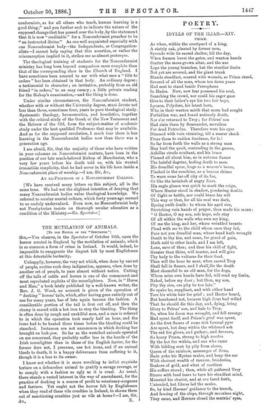POETRY.
IDYLLS OF THE ILIAD.—XIV.
PRIAM.
As when, within the courtyard of a king,
A stately oak, planted by former men, Spreads wide its sacred shelter, till the day, When foemen burst the gates, and wanton hands Scatter the moss-grown altar, and the axe Lops the young branches, but the sturdier limbs Not yet are severed, and the giant trunk Stands steadfast, scarred with wounds, so Priam stood, Severed of all the sons, whom ten fierce years Had sent to stand beside Persephone In Hades. Now, new fear possessed his soul, Searching the crowd, nor could his eager gaze Give to their father's eye his two fair boys, Lycaon, Polydore, his latest born, Who in their wanton mirth that morn had sought Forbidden war, and found untimely death, Nor e'er returned to Troy ; for Peleus' son Had slain them by Scamander, merciless For dead Patroclus. Therefore were his eyes Dimmed with vain straining, till a nearer shock Froze them to sudden fixedness, for lo !
So far from forth the walls as a strong man May hurl the quoit, contending in the games, Achilles strode exultant, and his brass Flamed all about him, as in autumn flames The baleful dogstar, boding death to men.
His dreadful spear, huge as a weaver's beam, Flashed in the sunshine, as a beacon shines To warn some far-off city of its foe, Or like the levinbolt of angry Zeus.
His eagle glance was quick to mark the coign, Where Hector stood in shadow, pondering doubts Of flight or battle, nor could brace his will This way or that, for all his soul was dark, Eyeing swift death : to whom his aged sire, Stretching vain hands of prayer, thus made his moan : " 0 Hector, 0 my son, sole hope, sole stay Of all within the walls who own me king, Of me the king, and her, whose wrinkled breasts Plead with me to the child whom once they fed, Face not you dreadful man, whose hand hath wrought Death to thy kin, and some, for greed of gain, Hath sold to other lands, and I am left, Lone, save of thee; and thee his skill of fight, Greater than thine, will master, and will give Thy body to the vultures for their food.
Then will the hour be near, when sacred Troy Shall fall in flames, and I shall:die the death Most shameful to an old man, for the dogs, Whom mine own hands have fed, will rend my limbs, Naked, before my door ; but thou, my son, Pity thy sire, ere pity be too late."
So spake he, suppliant, and with either hand Tore his white hair for grief ; and Hector heard, But hearkened not, because high Zeus had willed That he should die this day, and, dying, bring Glory to Peleus' son, and bale to Troy.
So, when his doom was wrought, and fell revenge Had spent itself, and Priam's grief was spent, As the first flames of some rich funeral pyre Are spent, but deep within the whitened ash The red fire glows, and gathers, and devours, So hoary Priam, strung to high resolve By the hot fire within, and one who came With bidding sent by pity from above, Queen of the rainbow, messenger of Zeus, Bade yoke his Mysian mules, and heap the car With choicest wealth of ransom, broideries, Beakers of gold, and what of costliest His coffers stored ; then, while all gathered Troy Strove with loud tears to tarn his steadfast mind, Mounted his chariot, and at eve fared forth, Untended, but Hams led the mules. So, by kind Hermes' guidance to the trench, And fencing of the ships, through moonless night, They came, and Hermes closed the sentries' eyes,




































 Previous page
Previous page